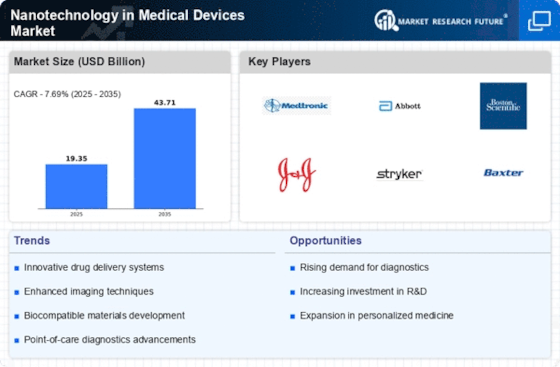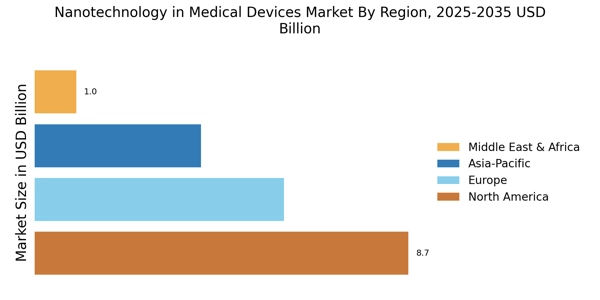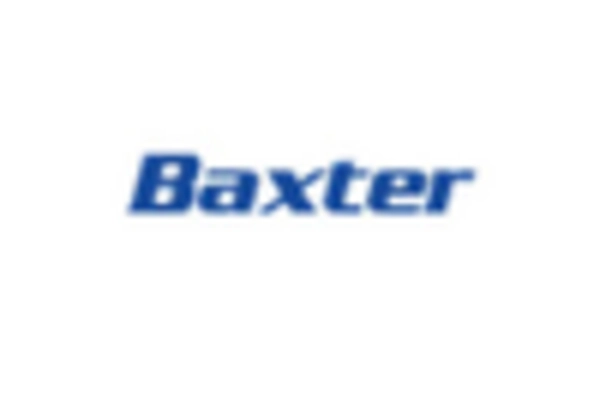Advancements in Diagnostic Technologies
The evolution of diagnostic technologies is significantly influencing the Nanotechnology in Medical Devices Market. Innovations in nanotechnology are enabling the creation of highly sensitive diagnostic tools that can detect diseases at earlier stages. For example, nanosensors and nanobiosensors are being developed to identify biomarkers with remarkable accuracy. The market for diagnostic devices is expected to witness considerable growth, with projections indicating a compound annual growth rate that reflects the increasing reliance on early detection methods. This trend not only enhances patient outcomes but also drives the demand for nanotechnology-based solutions, thereby reinforcing the importance of the Nanotechnology in Medical Devices Market.
Increased Focus on Personalized Medicine
The shift towards personalized medicine is emerging as a significant driver in the Nanotechnology in Medical Devices Market. Tailoring medical treatments to individual patient profiles enhances therapeutic efficacy and minimizes adverse effects. Nanotechnology plays a crucial role in this paradigm shift by enabling the development of customized medical devices and drug formulations. For instance, nanoparticles can be engineered to deliver drugs specifically to targeted cells, improving treatment outcomes. The market for personalized medicine is projected to grow substantially, indicating a strong demand for innovative solutions that integrate nanotechnology. This trend highlights the potential of the Nanotechnology in Medical Devices Market to contribute to more effective and individualized healthcare solutions.
Growing Investment in Research and Development
Investment in research and development is a critical driver for the Nanotechnology in Medical Devices Market. As stakeholders recognize the potential of nanotechnology to transform medical devices, funding for innovative projects is on the rise. Governments and private entities are allocating resources to explore new applications of nanotechnology in healthcare. This influx of capital is likely to accelerate the development of novel medical devices that leverage nanoscale materials and processes. The increasing number of patents filed in this domain suggests a burgeoning interest in nanotechnology applications, which could lead to breakthroughs that enhance device performance and patient care within the Nanotechnology in Medical Devices Market.
Aging Population and Chronic Disease Prevalence
The aging population and the rising prevalence of chronic diseases are pivotal factors driving the Nanotechnology in Medical Devices Market. As the demographic landscape shifts, there is a growing need for advanced medical devices that can address complex health issues associated with aging. Nanotechnology offers innovative solutions, such as targeted drug delivery systems and smart implants, which are essential for managing chronic conditions. The market for chronic disease management devices is anticipated to expand significantly, reflecting the urgent demand for effective healthcare solutions. This demographic trend underscores the necessity for advancements in the Nanotechnology in Medical Devices Market to cater to the evolving healthcare needs.
Rising Demand for Minimally Invasive Procedures
The increasing preference for minimally invasive procedures is a notable driver in the Nanotechnology in Medical Devices Market. Patients and healthcare providers alike are gravitating towards techniques that reduce recovery time and minimize surgical trauma. Nanotechnology facilitates the development of advanced medical devices that enhance precision and efficacy in such procedures. For instance, nanomaterials are being utilized in surgical instruments and implants, leading to improved biocompatibility and reduced infection rates. According to recent estimates, the market for minimally invasive surgical devices is projected to reach substantial figures, indicating a robust growth trajectory. This trend underscores the potential of nanotechnology to revolutionize surgical practices, thereby propelling the Nanotechnology in Medical Devices Market forward.
.png)
















